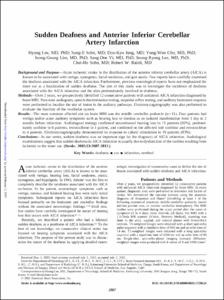Sudden Deafness and Anterior Inferior Cerebellar Artery Infarction
- Keimyung Author(s)
- Lee, Hyung; Sohn, Sung Il; Jung, Du Kyo; Cho, Yong Won; Lim, Jeong Geun; Yi, Sang Do; Lee, Seong Ryong; Sohn, Chul Ho
- Department
- Dept. of Neurology (신경과학)
Dept. of Pharmacology (약리학)
Dept. of Radiology (영상의학)
Brain Research Institute (뇌연구소)
- Journal Title
- Stroke
- Issued Date
- 2002
- Volume
- 33
- Issue
- 12
- Keyword
- deafness; ear; infarction; cerebral
- Abstract
- Background and Purpose: Acute ischemic stroke in the distribution of the anterior inferior cerebellar artery (AICA) is known to be associated with vertigo, nystagmus, facial weakness, and gait ataxia. Few reports have carefully examined the deafness associated with the AICA infarction. Furthermore, previous neurological reports have not emphasized the inner ear as a localization of sudden deafness. The aim of this study was to investigate the incidence of deafness associated with the AICA infarction and the sites predominantly involved in deafness.
Methods: Over 2 years, we prospectively identified 12 consecutive patients with unilateral AICA infarction diagnosed by brain MRI. Pure-tone audiogram, speech discrimination testing, stapedial reflex testing, and auditory brainstem response were performed to localize the site of lesion in the auditory pathways. Electronystagmography was also performed to evaluate the function of the vestibular system.
Results: The most common affected site on brain MRI was the middle cerebellar peduncle (n=11). Four patients had vertigo and/or acute auditory symptoms such as hearing loss or tinnitus as an isolated manifestation from 1 day to 2 months before infarction. Audiological testings confirmed sensorineural hearing loss in 11 patients (92%), predominantly cochlear in 6 patients, retrocochlear in 1 patient, and combined on the affected side cochlear and retrocochlear in 4 patients. Electronystagmography demonstrated no response to caloric stimulation in 10 patients (83%).
Conclusions: In our series, sudden deafness was an important sign for the diagnosis of AICA infarction. Audiological examinations suggest that sudden deafness in AICA infarction is usually due to dysfunction of the cochlea resulting from ischemia to the inner ear.
- Publisher
- School of Medicine
- Citation
- Hyung Lee et al. (2002). Sudden Deafness and Anterior Inferior Cerebellar Artery Infarction. Stroke, 33(12), 2807–2812. doi: 10.1161/01.STR.0000038692.17290.24
- Type
- Article
- ISSN
- 0039-2499
- 파일 목록
-
-
Download
 oak-aaa-4370.pdf
기타 데이터 / 376.72 kB / Adobe PDF
oak-aaa-4370.pdf
기타 데이터 / 376.72 kB / Adobe PDF
-
Items in Repository are protected by copyright, with all rights reserved, unless otherwise indicated.